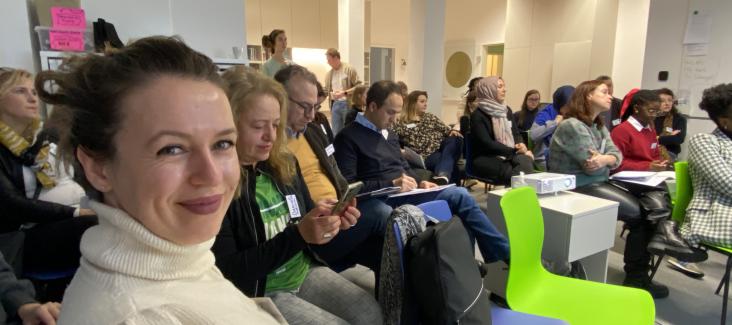Parliament for the Future of Europe is a EU funded project coordinated by us at Democracy International that will continue for the next 1.5 years until the 2024 European Parliament elections. The project involves 6 other partner organizations from the 6 EU Member States with the lowest voter turnouts in the last European elections. The goal: to scrutinize the proposals of the Conference on the Future of Europe (CoFoE) and reshape them to be more inclusive and to better meet the needs of marginalized and underrepresented groups.
Rewind back to fall 2021: the European Citizens’ Panels just launched, and one of the top civil society criticisms of the process was the lack of inclusiveness. While the European Citizens’ Panels, in theory, should be a mirror of European society due to the nature of the sortition process of citizens’ assemblies, those underrepresented groups in traditional political participation practices remained underrepresented in the European Citizens’ Panels. This is especially concerning when discussing topics like migration, where those who would be most affected by EU migration policy could not be seen in the room.
This is the gap that the Parliament for the Future of Europe aims to close. At the project kick-off event at our office in Cologne, we aimed to implement the practices and inclusion methods that were identified were missing during the CoFoE process. Above all, the inclusion of marginalized, vulnerable, and underrepresented groups. We recruited participants to the event so that the voices of those that were not heard during the CoFoE process, and that typically are not heard in politics, were this time put front and center.
Providing a safe space and ensuring that all voices in the room were adequately heard was our top priority. Here’s how we did it:
• The size of the group matters. We assigned participants in group work of maximum 5 people.
• We introduced easy participation methods such as colored-sticker-method of giving initial feedback to the proposals.
• We implemented various facilitation techniques such as sharing withholds, talking stick method, mind mapping, timed speaking, and sticky note method to ensure everyone had a chance to speak and no one could dominate the discussion.
• And we allocated an awareness team in case certain needs were not met or interventions were needed.
Expert Viktoria Sereda from the Freie Universität Berlin offered input on migration policy especially in regards to the war in Ukraine. After a world cafe exercise of identifying which CoFoE migration proposals need further re-visiting, in the afternoon, expert Karim Zafer from the University of Cologne helped the group deconstruct the concept of migration and think about migration from a decolonial and anthropological perspective. By speaking about the lived experiences with migration, it offered participants in the room the opportunity and space to share their own lived experiences with migration in breakout groups with various inclusive methods of moderation.
What was discovered throughout the process solidified what we knew all along. By directly deliberating with underrepresented communities, democratic processes and outcomes ultimately leads to better policy-making. The result: new migration proposals, based on the needs and perspectives of underrepresented and vulnerable groups, were drafted and adopted. Find them
here.
The project continues to involve with CoFoE topics such as digital transformation; economy and social justice; youth, culture and education; climate and the environment; EU in the world; European democracy. In the months leading to the 2024 European elections, a local “get to know your candidates, get to know your constituents” event will take place in each of the 6 partner countries where the new CoFoE proposals will be presented to candidates for European parliament. The candidates will be encouraged to put the proposals forward to become a true parliament for the future of Europe!
See you next time in Estonia, Portugal, Bulgaria, Croatia, Czech Republic, and Slovenia!

